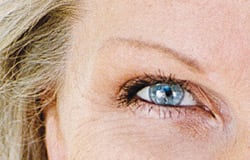- Science & Research
- Science News
- Newsletter
- 2012
- January 20

Newsletter
Newsletter
Vitamin D Rejuvenates Aging Eyes In Laboratory Study
Vitamin D rejuvenates aging eyes in laboratory study
Friday, January 20, 2012. An article published online on January 2, 2012 in the journal Neurobiology of Aging reports an eye-rejuvenating benefit for a short course of vitamin D supplementation in aged mice. Professor Glen Jeffery and his associates at the Institute of Ophthalmology at University College London supplemented old mice with vitamin D3 for six weeks while an untreated group served as controls. In addition to improved vision, the team found a reduction in number and changes in the configuration of retinal macrophages—immune cells that can sometimes cause excessive inflammatory damage—in animals that received the vitamin, as well as a decrease in retinal amyloid beta accumulation, which is a marker of aging. In humans, inflammation and amyloid beta accumulation are associated with an increased risk of age-related macular degeneration, a leading cause of blindness. "In the back of the eyes of mammals, like mice and humans, is a layer of tissue called the retina," explained Dr Jeffery. "Cells in the retina detect light as it comes into the eyes and then send messages to the brain, which is how we see. This is a demanding job, and the retina actually requires proportionally more energy than any other tissue in the body, so it has to have a good supply of blood. However, with aging the high energy demand produces debris and there is progressive inflammation even in normal animals. In humans this can result in a decline of up to 30% in the numbers of light receptive cells in the eye by the time we are 70 and so lead to poorer vision." "When we gave older mice the vitamin D we found that deposits of amyloid beta were reduced in their eyes and the mice showed an associated improvement of vision," he continued. "People might have heard of amyloid beta as being linked to Alzheimer's disease and new evidence suggests that vitamin D could have a role in reducing its build up in the brain. So, when we saw this effect in the eyes as well, we immediately wondered where else these deposits might be being reduced." Further experimentation revealed a decrease in amyloid beta build-up in the animals' blood vessels, including the aorta, which is the major vessel that carries blood from the heart. "Finding that amyloid deposits were reduced in the blood vessels of mice that had been given vitamin D supplements suggests that vitamin D could be useful in helping to prevent a range of age-related health problems, from deteriorating vision to heart disease," Dr Jeffery noted. "Many people are living to an unprecedented old age in the developed world," commented Professor Douglas Kell, Chief Executive of the Biotechnology and Biological Sciences Research Council BBSRC who funded the study. "All too often though, a long life does not mean a healthy one and the lives of many older people are blighted by ill health as parts of their bodies start to malfunction." "If we are to have any hope of ensuring that more people can enjoy a healthy, productive retirement then we must learn more about the changes that take place as animals age," he added. "This research shows how close study of one part of the body can lead scientists to discover new knowledge that is more widely applicable. By studying the fundamental biology of one organ scientists can begin to draw links between a number of diseases in the hope of developing preventive strategies." | ||||||||||||||||
 | ||||||||||||||||
| ||||||||||||||||
| ||||||||||||||||
 | ||||||||||||||||
| ||||||||||||||||
| ||||||||||||||||
The latest news on aging, nutrition, and vitamins
Lab
Testing
How Life Extension lab testing works











